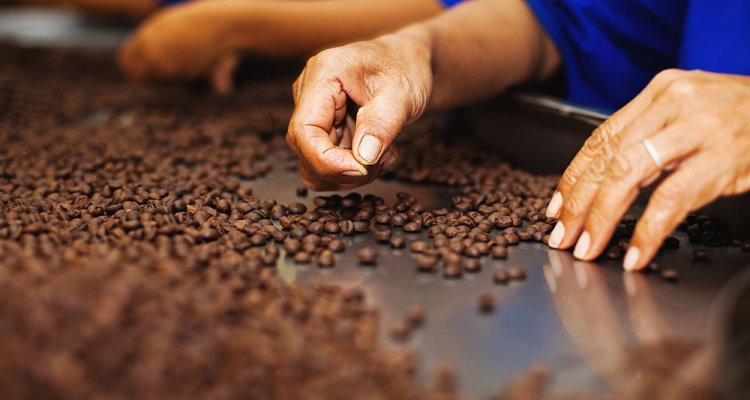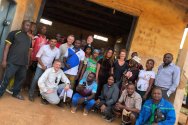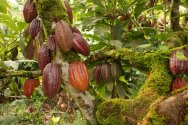
Dossier
Cocoa
The Netherlands processes more cocoa than any other country in the world, and cocoa dominates trading relationships between the Netherlands and partners in West Africa, Latin America and the Caribbean.
The EU is the world's largest importer of cocoa, accounting for 60% of world imports. Côte d'Ivoire, Ghana and Cameroon are the major suppliers of cocoa into the EU market worth EUR 4.6 billion (2021). Cocoa beans and products of primary processing (such as cocoa butter or paste) account for 71% of Côte d'Ivoire’s, 58% of Ghana’s and 29% of Cameroon’s total exports to the EU. These products are entering the European Union market tariff- and quota-free in the framework of Economic Partnership Agreements.
The consumption of chocolate in the Netherlands, Europe and the United States is increasing every year. In China, India and Brazil too, demand is rising. Over the next few years, it is forecast that over a million tonnes of cocoa more will be needed. Annual production is currently around four million tonnes. To meet future needs, cocoa cultivation will have to be either intensified, and/or productivity increased and its production made more sustainable. This poses critical challenges in dealing with increasingly impoverished soils, ensuring male and female farmers earn a living income from cocoa, avoiding child and slave labour on cocoa farms, maintaining biodiversity on-farm and in cocoa growing regions, avoiding deforestation caused by cocoa and demonstrating this to importing countries and consumers. There are trends towards new uses, products and processing of beans, cocoa butter, pods, husks, and juice. There is growing interest in more diversified, differentiated, quality, flavoursome and healthy cocoa and chocolate products, and for cocoa that is resilient to pests and diseases and climate change; and resists taking up cadmium. How the industry works and the politics of global and national markets has been at the centre of debates for decades: who benefits and gains; and how the trade and markets are governed to be profitable, transparent and equitable. Questions are increasingly being raised about how (big) data in the cocoa value chain is generate, used and shared, for example in traceability schemes, in sustainability certification, and informing and communicating with consumers.
Wageningen University & Research and sustainable cocoa
The Netherlands, being a world player in the cocoa trade, performs an important role in realising sustainable chocolate. In 2011, several leading stakeholders such as Mars, HEMA and Plus supermarkets signed an ambitious agreement aiming to achieve fully sustainable cocoa consumption in the Netherlands by 2025.
By carrying out action-oriented, theoretical and empirical research – often in collaboration with different actors in the cocoa sector and academic partners worldwide - into ways of producing cocoa, how cocoa and chocolate are used, processed, traded, marketed and consumed and measuring the outcomes of different approaches, Wageningen University & Research contributes to efforts to make cocoa more sustainable.
Experts
Publications 2023 - 2022
-
Oversight configuration and sustainability in global commodity chains : Learnings from cocoa
Wageningen University. Promotor(en): Peter Oosterveer, Francois Ruf, S.R. Vellema - Wageningen: Wageningen University - ISBN: 9789464475036 -
Maillard reaction in cocoa : The use of fluidized bed roasting tomodulate aroma compounds and physiological aspects
Wageningen University. Promotor(en): V. Fogliano, co-promotor(en): B. Ataç Mogol - Wageningen: Wageningen University - ISBN: 9789464476262 -
Drivers of cocoa yield under current and future climates
Wageningen University. Promotor(en): N.P.R. Anten, P.A. Zuidema, co-promotor(en): D.M.A. Rozendaal, E. Rahn - Wageningen: Wageningen University - ISBN: 9789464476088 -
Integrated soil fertility management : A path to sustainable intensification of cocoa production in West Africa?
Wageningen University. Promotor(en): K.E. Giller, co-promotor(en): A.G.T. Schut, L.S. Woittiez, L. Rusinamhodzi - Wageningen: Wageningen University - ISBN: 9789464476613 -
The making of inclusive value chains : Insights from service delivery initiatives in Ghana’s cocoa chain
Wageningen University. Promotor(en): S.R. Vellema, co-promotor(en): M. Slingerland, R. Asare - Wageningen: Wageningen University - ISBN: 9789464478020 -
Patterns of shade plant diversity in four agroforestry systems across Central America : a meta-analysis
Scientific Reports (2023), Volume: 13 - ISSN 2045-2322 -
Digestion and gut-microbiota fermentation of cocoa melanoidins : An in vitro study
Journal of Functional Foods (2023), Volume: 109 - ISSN 1756-4646 -
-
A framework to understand the social impacts of agricultural trade
Sustainable Development (2023), Volume: 31, Issue: 1 - ISSN 0968-0802 - p. 138-150. -
Mapping social impacts of agricultural commodity trade onto the sustainable development goals
Sustainable Development (2023), Volume: 31, Issue: 4 - ISSN 0968-0802 - p. 2363-2385.
Publications 2021 - 2020
-
Nutrient distribution in cocoa trees
-
No silver bullets : Closing the $10 billion income gap in cocoa calls for cross-sector action
-
Supporting planning for sustainable cocoa production: Balancing production, forests, biodiversity and ecosystem services
-
Cocoa Landscapes Toolkit
-
Risks to biodiversity from cocoa suitability shifts under a changing climate
-
Partnerships to Save the Planet: Motivations, Types and Impacts of Sustainability Partnerships
-
Development Aid, FDI and environmental protection in Africa
Wageningen University. Promotor(en): E.H. Bulte, co-promotor(en): M.J. Voors - Wageningen: Wageningen University - ISBN: 9789463955416 -
Following cocoa beans to chocolate : The search for intrinsic characteristics
Wageningen University. Promotor(en): S.M. van Ruth, co-promotor(en): M. Alewijn - Wageningen: Wageningen University - ISBN: 9789463953610 -
The interface between expert and farmer knowledge and practices of pruning in cocoa
-
Scenario-modelling for the sustainable management of non-timber forest products in tropical ecosystems
Biota Neotropica (2020), Volume: 20, Issue: supl. 1 - ISSN 1676-0611







